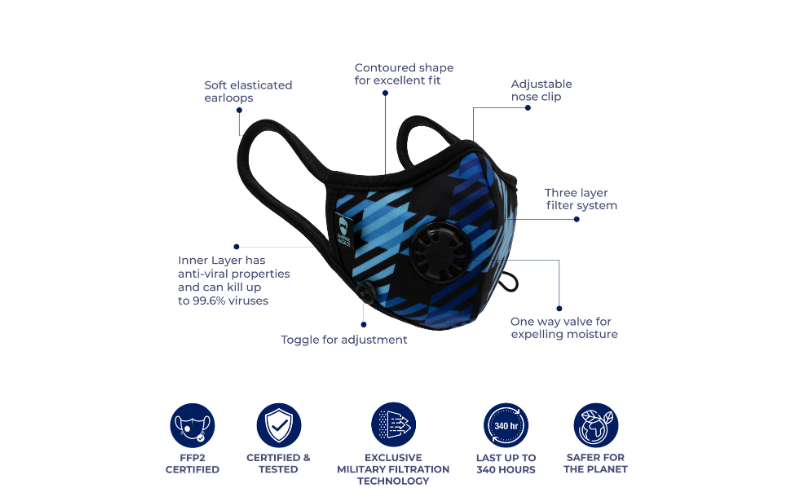
Understanding the Differences Between Surgical Masks and N95 Respirators
In the midst of a pandemic or during flu season, understanding the types of face masks available is crucial. Knowing the differences between an N95 respirator and a surgical mask can help you make an informed decision about the best protection for you and your loved ones. This blog will dive into what an N95 respirator is, what a surgical mask is, and the benefits of using an N95 respirator over a disposable surgical mask. We'll also explain why Cambridge Mask Co's face masks might be the N95 respirator you need.
What is an N95 Respirator?
An N95 respirator is a type of face mask designed to provide a very close facial fit and efficient filtration of airborne particles. The 'N95' designation means that when subjected to careful testing, the respirator blocks at least 95% of very small (0.3 micron) test particles. These masks are designed to achieve a very close facial fit, which is essential for maximum filtration. They are commonly used in healthcare settings and other environments where there is a high risk of airborne particles and pathogens.
N95 respirators are regulated by the National Institute for Occupational Safety and Health (NIOSH) in the United States, which ensures they meet strict performance standards. They are constructed with multiple layers of synthetic material, often polypropylene, and are designed to fit tightly to the face to minimize the leakage of unfiltered air.
What is a Surgical Mask?
A surgical mask is a loose-fitting, disposable device that creates a physical barrier between the mouth and nose of the wearer and potential contaminants in the immediate environment. These masks are intended to protect against large droplets, splashes, or sprays of bodily or other hazardous fluids, and they are also effective in preventing the wearer from spreading potentially infectious respiratory secretions. However, surgical masks do not provide a reliable level of protection from inhaling smaller airborne particles.
Surgical masks are regulated under different standards than N95 respirators, typically by the Food and Drug Administration (FDA) in the US. They are designed for one-time use and are made from a variety of materials, including paper and non-woven fabric, which offer different levels of fluid resistance and breathability.
The Differences Between an N95 Respirator and a Surgical Mask

Understanding the differences between an N95 respirator and a surgical mask can help you choose the right mask for your needs. Here are the key distinctions:
- Fit and Seal: N95 respirators are designed to fit tightly to the face, creating a seal that filters out airborne particles. This tight fit is achieved through adjustable straps and a moldable nose piece. Surgical masks are loose-fitting and do not provide a seal around the nose and mouth, allowing for potential leakage around the edges.
- Filtration Efficiency: N95 respirators filter out at least 95% of very small particles, including bacteria and viruses. This high level of filtration is critical in environments with a high risk of airborne transmission. Surgical masks primarily protect against large droplets and are not designed to filter smaller airborne particles effectively.
- Intended Use: N95 respirators are intended for use in environments with high exposure to airborne particles, such as healthcare settings, construction sites, and industrial environments. They are essential for tasks that involve exposure to hazardous particles. Surgical masks are designed to protect against droplets, splashes, and sprays and are commonly used in general healthcare environments and by the public during flu season or pandemics to prevent the spread of infection.
- Regulatory Standards: N95 respirators must meet rigorous standards set by NIOSH (National Institute for Occupational Safety and Health) in the US, ensuring they provide reliable and consistent protection. Surgical masks are regulated by the FDA and must meet specific standards for fluid resistance, filtration efficiency, and breathability.
Benefits of Using an N95 Respirator Over a Disposable Surgical Mask

While both N95 respirators and surgical masks serve important roles, N95 respirators offer several advantages:
- Superior Filtration: N95 respirators provide a higher level of filtration, making them more effective at filtering out smaller airborne particles, including viruses and bacteria. This makes them especially valuable in healthcare settings and other environments where there is a high risk of airborne transmission.
- Tighter Fit: The snug fit of an N95 respirator ensures that air does not leak around the edges, providing more reliable protection compared to the looser fit of surgical masks. The tight seal is crucial for keeping out airborne contaminants.
- Better Protection for the Wearer: While surgical masks are more effective at preventing the spread of pathogens from the wearer to others, N95 respirators provide better protection for the wearer themselves from inhaling hazardous airborne particles. This makes them essential for healthcare workers and others who are in close contact with infected individuals.
- Durability and Reusability: N95 respirators are often designed for longer use and can be worn for extended periods without compromising their effectiveness. Some N95 respirators are even designed to be reusable, provided they are properly sanitized between uses. This contrasts with the single-use nature of surgical masks, which need to be discarded after each use.
Why Choose Cambridge Mask Co's N95 Respirators?

Cambridge Mask Co offers face masks that are among the best N95 respirators available on the market. Here’s why their masks stand out:
- High Filtration Efficiency: Cambridge Mask Co's respirators filter out at least 95% of particles as small as 0.3 microns, providing excellent protection. They use a unique filtration system that includes a layer of activated carbon, which enhances their ability to filter out harmful substances.
- Comfort and Fit: These masks are designed to fit snugly yet comfortably on your face, ensuring a secure seal without compromising on comfort. The ergonomic design includes adjustable ear loops and a moldable nose piece, allowing for a personalized fit that reduces air leakage and enhances protection.
- Durability: Unlike single-use surgical masks, Cambridge Mask Co's respirators are durable and can be reused, offering better long-term value. They are constructed from high-quality materials that maintain their integrity and effectiveness over time, even with regular use.
- Advanced Technology: The masks incorporate advanced filtration technology, including a military-grade filtration system, ensuring superior performance in various environments. This technology not only filters out particles but also adsorbs gases and odors, providing comprehensive protection.
- Stylish Designs: Cambridge Mask Co offers a variety of stylish designs, making it easy to find a mask that fits your personal style while providing the protection you need. This combination of form and function makes their masks a popular choice for those looking for both safety and aesthetics.
Conclusion
In conclusion, choosing between a surgical mask and an N95 respirator depends on your specific needs. For environments with a high risk of airborne particles, such as healthcare settings, N95 respirators offer superior protection due to their tight fit and high filtration efficiency. They are designed to protect the wearer from inhaling hazardous particles, making them essential in high-risk situations.
Cambridge Mask Co's face masks provide the reliability and protection of an N95 respirator while also offering comfort, durability, and advanced filtration technology. Their masks are not only effective but also stylish and reusable, making them a practical and economical choice for long-term use.
By understanding the differences and benefits of each type of mask, you can make an informed decision to keep yourself and others safe. Whether you are a healthcare worker, someone with underlying health conditions, or simply looking to protect yourself during flu season or a pandemic, choosing the right mask is crucial.
Stay safe, stay informed, and choose the right mask for your needs.


